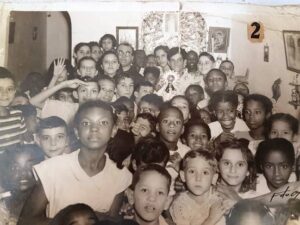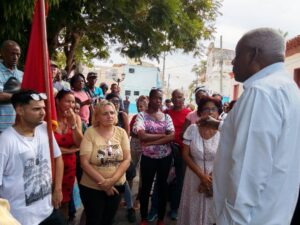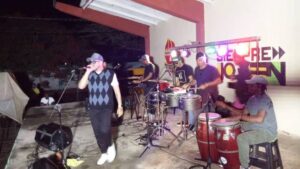Change without renouncing our strongest principles.
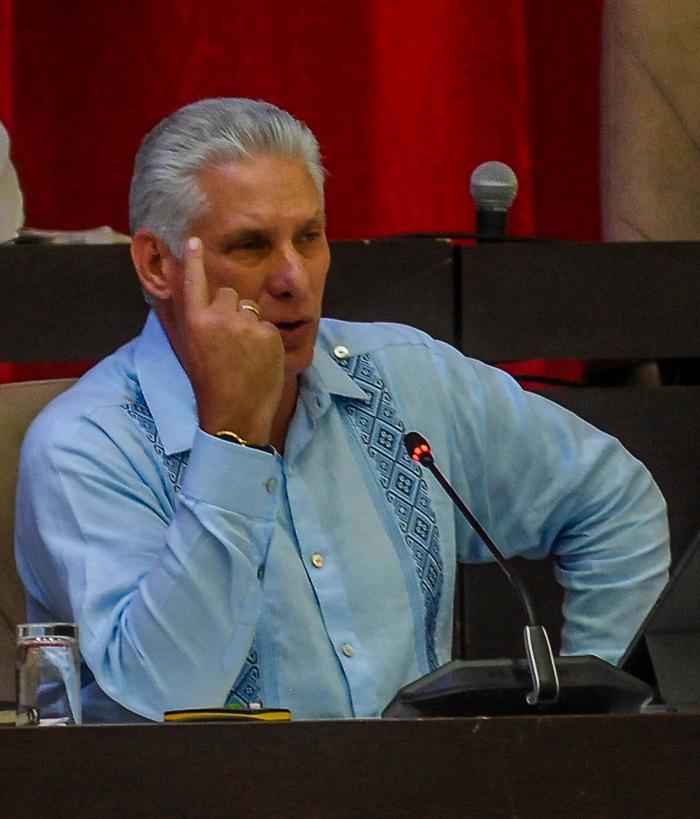
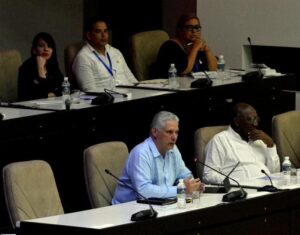
In a post-pandemic world, which idealistically aspired to be more about cooperation and solidarity, it became the opposite: a world where walls are being built instead of bridges, inequalities are growing, wars are being encouraged and blockades are intensifying. In such a world, we are not a bubble.
This is how the First Secretary of the Communist Party of Cuba and President of the Republic, Miguel Díaz-Canel Bermúdez, began his speech, speaking on the day before the Second Extraordinary Session of the 10th Legislature of the National Assembly of People’s Power (ANPP).
In that complexity, he added, the blockade was intensified in the second half of 2019 and we are included in 2020 in a «spurious list» that classifies Cuba as a country sponsoring terrorism.
The president explained that the inclusion on that list – where we still remain – responds to two pretexts: the so-called sonic attacks on US embassy officials in Cuba, an issue denounced by our country and argued by our scientists to the point that the US intelligence community recognised that no such attacks took place.
The other pretext used, he said, was the permanence of a delegation of the National Liberation Army in Cuba, a request made by the government of Juan Manuel Santos at the beginning of the dialogue process, where a protocol was signed to guarantee the integrity of all the parties involved in the process.
The First Secretary of the Party denounced the imperialist logic that has been applied aggressively by the US government against Cuba, and which has included, in economic terms, the intensified blockade, financial and energy persecution, pressure, inclusion on the list of terrorist countries, and economic asphyxiation of the country, in order to provoke popular discontent.
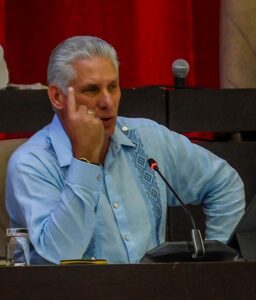
Ideologically, he pointed out, it has been characterised by a media campaign of discrediting, the encouragement of hatred, lies, deceit and slander against the country; attempts at cultural colonisation, all with the aim of isolating the Revolution.
In spite of this, and in a pandemic context, we are the country that has administered the most doses of vaccines per inhabitant with an efficient treatment against the pandemic.
In the face of this aggressive imperialist logic,» Díaz-Canel stressed, «the country has followed the path of continuing socialist construction, combining the challenge between the necessary and possible alternative in the process and in the project.
He also praised the defence of independence and sovereignty, creative resistance, the struggle to achieve the greatest possible social justice, the fundamental role of the Socialist State Enterprise, the participation of the people and the workers, and prosperity.
The Head of State stressed that 2023 has been a difficult year, but in order to make it better, he has focused on the follow-up and fulfilment of what was agreed at the 8th Party Congress, while important social and political processes have taken place, such as the Referendum on the Family Code, the Municipal Elections, the elections of deputies and the constitution of the new National Assembly of People’s Power.
Díaz-Canel expressed that one of the work objectives for this year is to overcome the complex economic and social situation with an integral political assurance demanding from the Party, which stimulates the understanding and participation of the people, strengthens unity, raises hope, causes the improvement of the functioning of the ANPP and favours an agile and effective management of the government.
He added that it is necessary to prepare the reserve of cadres to occupy the highest party, state and government responsibilities in the country in five years’ time.
The Cuban leader stressed the importance for the work of recognising concepts such as independence, sovereignty, socialist democracy, economic efficiency, citizen security, social justice, anti-imperialism, as well as the struggle for prosperity that includes everything from food to recreation.
He stressed that the proper functioning of our institutions is important; when they function badly, they discredit the Revolution and the process of socialist construction.
On the perception of risks, the President said he insisted on confronting corruption, illegalities, social indiscipline, «not to be naïve in the face of the complexities we are experiencing and not to let the problems accumulate, we must try to tear them out a little bit every day» because we cannot solve them all at once in their entirety.
He reflected that yes, we must change everything that needs to be changed, but without leaving the tried and tested path, «without ever departing from the concept of Revolution, but free of rigid ties and aware of the possible misunderstandings». Generational continuity is a fundamental part of unity, he added.
WHAT IS POLITICS
In response to this question, taking up the work and thoughts of the Commander-in-Chief and Jose Martí, Díaz-Canel defined the important elements for making politics in our country as, first and foremost, culture, seen in its broadest sense as the roots, history, the formation of the nation, our values. And in that culture and in that history, there are teachings that can give us the answers to everything we face in the present and what we will face in the future, said the President.
He stressed that the other pillar of this way of doing politics is ethics, because it has to do with the values we share.
We have tremendous strength to defend what we want to achieve in law, which is what is just, always remembering that our conception is to achieve the greatest possible social justice; and in truth, with the truth you always win, he stressed.
I believe that these are elements that we have to know how to combine in order to carry out our work, he said.
The other is to defend the concept of popular power developed by the Commander-in-Chief, he said. There has to be a whole framework that facilitates, that allows us to develop popular participation, democracy, and for that there has to be space, we have to continue building spaces, we have to continue perfecting the spaces where from the residents of the constituency, as their representative, who are the delegates of the constituencies; the president of the council and also the deputies, there are enough spaces to debate, to review, to criticise, to propose, to evaluate each of our situations and the most important issues of the country’s agenda, of the public agenda. But that this is expressed in participation, which is already an element of democracy, that what is debated in these spaces is taken by the representatives of the people to the decision-making body.
The Head of State added that at a time like this we dare to propose five fundamental, interrelated directions: economic development, attention to social problems, institutional strengthening, work with cadres and ideological strengthening.
Another of the priorities for stabilising economic and social indicators is to promote local food production and marketing, said the President of the Republic, referring to the current situation in the country in this area.
He warned that today most of the basic food basket distributed to the population is imported, at a cost of more than 2.2 billion dollars, which hinders its supply and stability due to the high prices of food at a global level.
For this reason, he asserted, the food that the country needs must be produced locally, and indicated that, among the actions to achieve this purpose, it is urgent to update the conceptualisation of agriculture, to recover the role of the state agricultural company and to promote a payment system aimed at producers at the local level in order to achieve food sovereignty.
He also pointed to the issue of investment in food production. In this regard, he said that international entities have provided more than 300 million dollars in financing that have not been well used.
In view of this situation, he called for an analysis of these projects with international financing, as well as the projects that have been halted to be rescued with foreign investment.
The president also urged to look for possibilities of allocating stable fuel for agriculture, inputs and fertilisers, and their location in the best producers (productive poles).
He also called for the development of mini-industries, the promotion of self-consumption, the creation of solid and robust local production systems, and the promotion of productivity in both the state and non-state sectors.
On economic development, the President referred to the current price situation in the country. «The ideal way to improve prices is to produce more,» he said.
In this regard, he stressed that there is an abusive character with prices where there are those who take advantage of the opportunity to get rich.
This must be confronted; the measures approved by the Council of Ministers must be ensured and implemented; the collection and commercialisation by the state must be improved; contracting must be improved; discussions must be held with the commercialisation actors; illegal sales and the illegal foreign exchange market must be tackled.
The tourism development programme has been updated to include the visions of the area, to connect sales, business and health tourism, and to discuss the development of sustainable tourism modalities.
He added that incentives are being sought to encourage the collection of remittances, cryptocurrencies, collection and payment operations abroad, the banking of the currency and e-commerce, eliminating payments in CL, and seeking joint production models between the state and non-state sectors.
In the case of foreign trade and foreign investment, he added, we have to get rid of the immobility that we have seen in different organisations and institutions in the country in order to advance foreign investment projects.
He said that during visits abroad, when we meet with our diplomatic officials, one of the recurring complaints is the passivity, the delay, and even the indifference of institutions and organisations to respond to cooperation and investment interests.
«How can a country blocked in the conditions in which our economy operates afford such luxuries,» the president questioned, and we are going to demand responsibility in those places where we see this indolence, he added.
He added that foreign investment in domestic trade and food production should be speeded up.
In the pillar of social care, the First Secretary of the Party referred to social work and families and people in vulnerable situations, to the Youth Policy, to the design of a system of popular confrontation, to more rigorous criminal proceedings and analysis at the community level.
With regard to institutional strengthening, especially in the ANPP, he indicated that he demanded the fulfilment of everything approved in the sessions of the Parliament, quarterly visits by the deputies to the base, the processing and follow-up of these visits, as well as the resolution of the problems raised, the rendering of accounts of the administrations, as well as the transparency of the budgets and their execution.
As he had said at the 6th Party Plenary, Díaz-Canel reiterated that the road ahead is full of challenges and adversities that we are obliged to face and overcome with a spirit of victory, with effort and talent, with determination, unity and creativity; each one doing their part, encouraging, motivating and demonstrating that it is possible. «This is how we will achieve victory,» he concluded.


